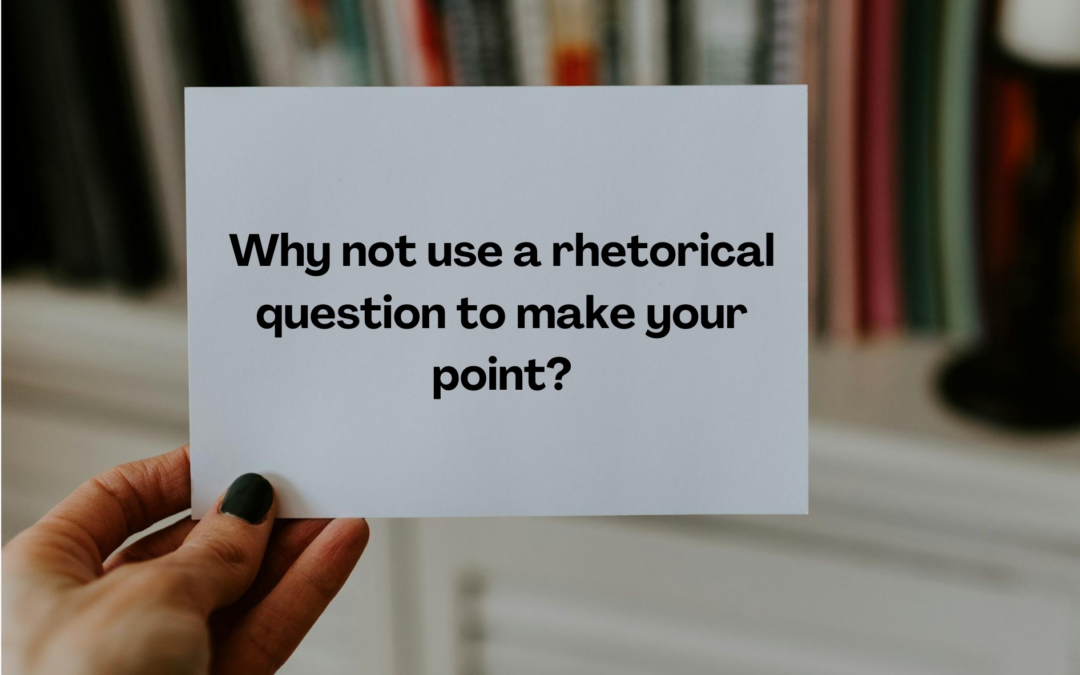Rhetorical questions are a powerful tool in communication, often used to make a point or inspire thought without expecting an answer. Whether you’re writing an essay, giving a speech, or simply looking to enhance your persuasive skills, mastering rhetorical questions can elevate your work. In this guide, we’ll explore 30 rhetorical question examples and how to use them effectively, especially in essays.
What Are Rhetorical Questions?
Rhetorical questions are a powerful tool in the realm of persuasive communication. They are a form of interrogative expression used to make a point or convey a message rather than to elicit a direct response. These questions are crafted with a specific intention, often to provoke thought, engage the audience, or emphasize a particular idea. Here’s a clear and easy-to-understand explanation of rhetorical questions:
Rhetorical questions are inquiries posed in conversation or writing that do not require or expect an actual answer. Instead, they serve as a persuasive or rhetorical device, designed to make a statement, emphasize a point, or provoke critical thinking in the audience.
The biggest difference between rhetorical questions and typical questions in that rhetorical questions are not used to gather information or seek a response from others. Rather, they function as a means of guiding the listener or reader’s thoughts in a particular direction. They are strategically employed to emphasize a message, create a sense of engagement, or encourage reflection.
The Purpose of Rhetorical Questions
Rhetorical questions are commonly used in persuasive speeches, essays, debates, and everyday communication to achieve various objectives. Here are some key purposes:
Emphasis – Rhetorical questions can draw attention to a specific idea or argument by framing it as a question. For example, “Do we want to continue down a path of destruction?” emphasizes the gravity of the situation.
Engagement – These questions engage the audience by prompting them to consider the topic more deeply. For instance, “Have you ever wondered what the future holds?” encourages the audience to reflect on possibilities.
Affirmation – Rhetorical questions often lead the audience to agree with the implied answer, reinforcing the speaker’s point. An example is, “Is it not our moral duty to help those in need?” which presupposes that helping others is a moral obligation.
Persuasion – By framing an argument as a rhetorical question, the speaker can guide the audience to a specific conclusion. For instance, “Wouldn’t you agree that a healthier lifestyle leads to a happier life?” implies that the answer is yes.
30 Best Rhetorical Questions Examples
1. What’s not to love about a beautiful sunset? Rhetorical questions like this one evoke a sense of wonder and appreciation, inviting the audience to share the sentiment.
2. Are you going to let fear hold you back from your dreams? This question challenges the audience to confront their fears and consider the impact on their aspirations.
3. Do you think the world would be a better place without acts of kindness? By implying a positive response, this question emphasizes the importance of kindness in society.
4. Can you imagine a world without art and creativity? It highlights the significance of art and creativity in our lives, making the audience reflect on their value.
5. Is it possible to put a price on freedom? This question prompts reflection on the intangible value of freedom.
6. Why do we fall? So we can learn to pick ourselves up. Rhetorical questions like this can be motivational, emphasizing the importance of resilience.
7. Does anyone really believe in a perfect world? It invites contemplation about the idealistic notion of a perfect society.
8. What’s more important than the health and well-being of our children? This question highlights the paramount importance of children’s welfare.
9. Could we exist without the air we breathe? It emphasizes the fundamental nature of oxygen to human existence.
10. Is there a single recipe for happiness that suits everyone? This question suggests the subjectivity of happiness and personal fulfillment.
11. Is it fair to judge a book by its cover? This age-old question prompts reflection on the issue of prejudice and superficial judgments.
12. Can you really put a price on love? This question emphasizes the idea that love is priceless and beyond monetary value.
13. Who doesn’t want to be successful in life? This question assumes that everyone desires success, making the audience ponder their own aspirations.
14. Do you think anyone would willingly choose pain over pleasure? It underlines the universal preference for pleasure and avoidance of pain.
15. Is there anything more refreshing than a cold glass of water on a hot day? This question appeals to our shared experience of relief on a scorching day.
16. What could be more comforting than the embrace of a loved one? This rhetorical question highlights the emotional value of human connection.
17. Can we really call ourselves civilized when we still wage wars? This question provokes thought about the contradiction between civilization and conflict.
18. What’s stopping you from chasing your dreams? It encourages self-reflection and motivation to overcome obstacles.
19. Is there anything better than the sound of laughter? This question celebrates the universal joy associated with laughter.
20. How can we expect change if we never take action? It underscores the necessity of taking the initiative to bring about change.
21. Do you think the world would be the same without great leaders? This question underscores the impact of influential leaders throughout history.
22. What would life be without a sense of humor? It highlights the role of humor in our lives, promoting its significance.
23. Is there any greater tragedy than the loss of a loved one? This question evokes empathy and reflection on the depth of human emotion.
24. Can you really put a limit on human potential? It challenges the idea of constraining human capabilities.
25. What could be more fundamental than the pursuit of knowledge? This rhetorical question emphasizes the inherent human curiosity and thirst for knowledge.
26. Can you imagine a world without hope? It prompts reflection on the importance of hope in people’s lives.
27. Is there any greater bond than the love between a parent and child? This question celebrates the profound connection between parents and their children.
28. What would life be without challenges to overcome? It highlights the role of adversity in personal growth and development.
29. Is there a more powerful force than the unity of a community? This question emphasizes the strength of community and solidarity.
30. Who would trade the beauty of nature for a concrete jungle? It encourages reflection on the value of preserving natural environments
Good Rhetorical Questions for Essays:
When writing essays, rhetorical questions can be used to lead your reader to your point of view. Here are some effective examples to consider:
- “How can we expect change if we don’t take action?” – This question emphasizes the importance of initiative.
- “Isn’t it our duty to help those in need?” – A powerful way to appeal to the reader’s sense of morality.
- “What’s more valuable than freedom?” – A thought-provoking way to discuss personal liberties.
- “Can you imagine a world without art?” – This question makes readers reflect on the importance of creativity in society.
- “Is it fair to judge someone without knowing their story?” – A great way to introduce discussions on empathy or prejudice.
30 Best Rhetorical Questions for Essays and Speeches
Here’s a list of rhetorical questions that can be used in various types of communication, including essays and persuasive speeches. Use them strategically to inspire thought or strengthen your arguments:
- What’s more important than our health?
- Can anyone deny the value of kindness?
- How can we grow without learning from failure?
- Who doesn’t dream of success?
- Is there any greater power than love?
- What would life be like without challenges?
- How can we solve problems without cooperation?
- Why settle for less when we can strive for more?
- Is there anything more valuable than time?
- What kind of future do we want for our children?
- Who wouldn’t prefer peace over conflict?
- Is there any better teacher than experience?
- Can you imagine a world without hope?
- How can we improve if we never take risks?
- What’s stopping you from achieving your dreams?
- Is there anything more satisfying than helping others?
- Why wait until tomorrow when we can start today?
- Can we truly call ourselves free if others are oppressed?
- Is there any greater gift than love?
- Why do we fear change when it’s necessary for growth?
- Can we solve today’s problems with yesterday’s solutions?
- Is it right to ignore those in need?
- What’s life without a little adventure?
- Who wouldn’t want a brighter future?
- How can we expect respect without giving it?
- Is there anything more unifying than shared laughter?
- Can we achieve greatness without perseverance?
- What’s more precious than time with loved ones?
- Why do we hesitate when the world needs our help?
- Who would trade true happiness for material wealth?
Why People Use Rhetorical Questions?
Rhetorical questions serve various compelling purposes. Foremost among these is their ability to engage the audience or reader. They break the monotony of one-way communication and encourage active participation, thereby infusing the conversation or written text with dynamism and interactivity. Rhetorical questions also double as persuasive tools since they often imply a specific answer or point of view, subtly guiding the audience to consider the speaker or writer’s perspective.
Moreover, rhetorical questions can stimulate thought and critical thinking, encouraging individuals to ponder complex issues or view a subject from multiple angles. They possess the remarkable capacity to evoke emotions, eliciting empathy, curiosity, or reflection by framing an issue in a relatable manner. Additionally, rhetorical questions can be effectively employed to emphasize key points, rendering them memorable, and drawing attention to the essential aspects of a message.
Tips On How to Make Good Rhetorical Questions
- Consider your audience’s interests, values, and knowledge. Pattern your questions to resonate with their experiences and perspectives.
- Ensure your question is clear and concise. A complex question may confuse your audience and weaken the impact of your message.
- Rhetorical questions should stimulate thought. Make questions that encourage your audience to reflect on the subject matter.
- Rhetorical questions often imply an answer. Ensure that this answer connects with your intended message or argument.
- Use rhetorical questions to evoke emotions. Appeal to your audience’s feelings to make your message more impactful.
- Ensure that your rhetorical question is directly related to the topic at hand. Irrelevant questions can disrupt the flow of your communication.
- Don’t overuse rhetorical questions. Use them strategically to emphasize key points or engage your audience when necessary.
- While rhetorical questions can be powerful, using too many can lessen their impact. Use them sparingly for maximum effect.
- Some questions can be more complex, but be mindful of your audience’s ability to engage with the topic. Balance between simple and hard questions as needed.
- Crafting effective rhetorical questions is a skill that improves with Seeking feedback from peers or mentors to refine your use of rhetorical questions in your communication.
Upon discussing the key points about rhetorical questions, we learned that: the art of using rhetorical questions is a powerful tool in communication. As we’ve explored in this discussion, rhetorical questions can captivate your audience, prompt reflection, and enhance the impact of your message. By understanding your audience, tailoring your questions, and using them strategically, you can become a more persuasive and engaging communicator. Whether you’re delivering a speech, writing an essay, or simply engaging in a meaningful conversation, the use of rhetorical questions can elevate your communication to a new level. So, the next time you seek to make a point, inspire, or provoke thought, consider the art of the rhetorical question, and watch the power of your words come to life.
Read More: 10 Biggest Philosophical Dilemmas Examples
Read also: 30 Effective Guiding Questions Examples
The Most Popular on BitGlint

40 Social Dilemma Examples in the World & Real Life
Social dilemmas are everywhere. They shape the choices we make at work, in our communities, and even on a global...

30 Favor Examples & Definition
Doing a favor means helping someone without expecting anything in return. It’s an act of kindness that can strengthen...

30 Naivety Examples & Definition
Naivety is something most people experience at some point in their lives. It often starts in childhood, but for some,...

20 Chronology Examples & Meaning
Chronology is something we use more than we realize. It shows up in conversations, in how we remember the past, and in...

30 Wishful Thinking Examples & Meaning
Wishful thinking is something we all do at some point. You hope things will turn out fine—even if there’s no real...

20 Examples of Gravity & What Gravity Really Is
Gravity is one of the most important forces in the universe, but many people don’t fully understand what it really is...

20 Examples of Secondary Consumers in the Food Chain
Secondary consumers are animals that eat other animals—usually herbivores that feed on plants. They’re an important...
Get Inspired with BitGlint

